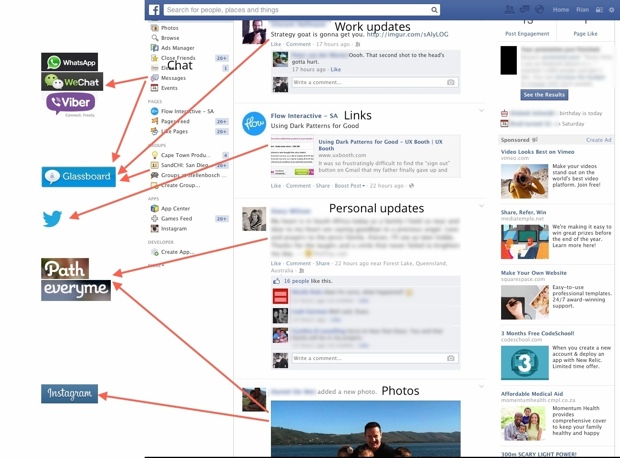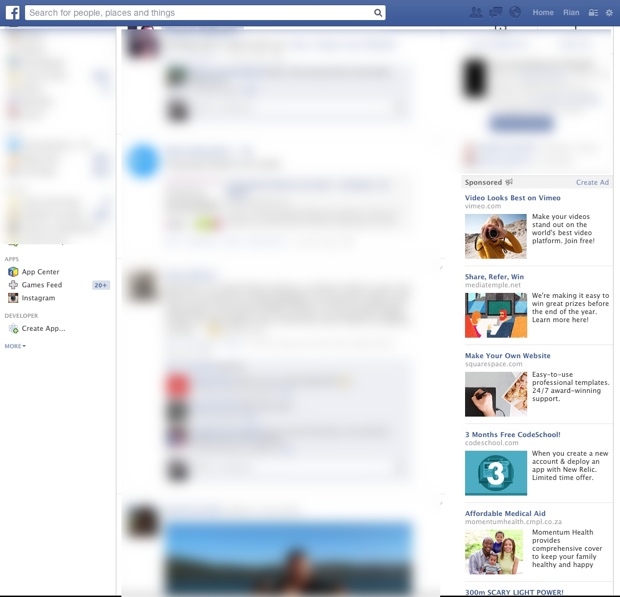About a year ago Chris Dixon wrote a great post called Some problems are so hard they need to be solved piece by piece. It was based on an old Andrew Parker post The Spawn of craigslist about how Craigslist is getting beaten not by another similar company, but by niche startups going after their business piece by piece. Chris writes:
Startups that have tried to go head-to-head against the entirety of Craigslist (the “horizontal approach”) have struggled. Startups that have tried to go up against pieces of Craigslist (the “vertical approach”) have been much more successful (e.g. StubHub, AirBnB).
Andrew’s chart got me thinking about Facebook, and it looks like something similar is happening in the social media space. There are, of course, many ways to cut this, but here’s a possible view of some of the startups and companies that are going after different pieces of Facebook:

A few thoughts on this:
- Messaging apps like WhatsApp, WeChat, and Viber are not just replacing 1:1 messaging, but group messaging as well. In fact, I keep hearing stories of people saying that WhatsApp has replaced Facebook entirely for them. They just create specific interest groups on WhatsApp and share photos and updates that way.
- Private social networks like EveryMe and Path might appear to be dead, but they’re sleeping giants. For those who want a little bit more than what WhatsApp can offer, Path is the perfect replacement to cut down on cruft while maintaining a small, meaningful network in an environment that’s designed to share everyday experiences. There’s no pressure to only share smart/funny/happy things, like there is on Facebook. Sharing what you’re eating for lunch is ok, because on Path you only connect with people who care about that stuff. It’s more about growing real-life relationships than maintaining virtual ones.
- Photos are moving to Instagram more and more (and don’t count out products like Flickr and VSCOcam’s grid). Of course, Facebook now owns Instagram, which looks like a great decision more and more every day.
- Glassboard remains small, but appears to be the preferred business version of Path, especially at industry conferences.
- The spread of links is more difficult to pin down, since they’re shared in so many different ways. I put a Twitter logo on the chart above, but I think what we’re seeing is more of a trickle down from one network to the next, something like this:

Things worth knowing about start on sites like imgur and 4chan (and others that I’m not brave enough to visit), as well as RSS feeds (yep, not dead yet). From there it spreads to reddit and 9gag, where the best stuff goes on to Twitter. Eventually — usually about 2 weeks later — a few of the best memes find their way all the way to Facebook.
The question is, what happens when people start moving up this funnel, away from Facebook to Twitter, to reddit, or even further? Then they won’t need Facebook to find interesting links any more, because Facebook is basically just a filter for links you can find sooner elsewhere.
But that’s not the only scary part. Here’s the other interesting thing. When you take away all the things on Facebook that can possibly replaced by niche products, you’re left with this:

Apps, and ads.
How long can a company sustain itself with that type of content?
Facebook is in a classic position where, as a dominant provider of horizontal social services, it is in danger of being taken down piece by piece by several vertical players who provide specific, narrow experiences very well. Facebook has become a social media firehose. It won’t be replaced by another firehose, but by a bunch of different cocktails that users can customize as they please.